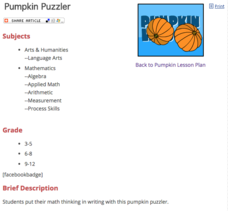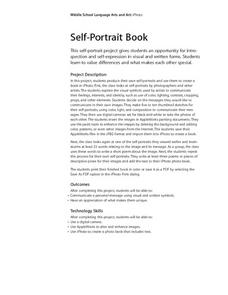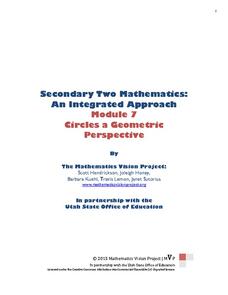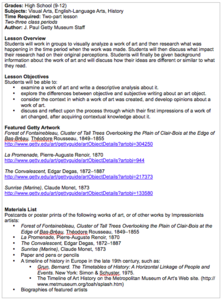EngageNY
Polynomial, Rational, and Radical Relationships
This assessment pair goes way beyond simple graphing, factoring and solving polynomial equations, really forcing learners to investigate the math ideas behind the calculations. Short and to-the-point questions build on one another,...
Science 4 Inquiry
The Real Story of Where Babies Come From
Pupils learn about both male and female anatomy before understanding how they work together to make a baby. Scholars discover new vocabulary, create a presentation on fertilization, and discuss related topics.
Curated OER
Irish Eyes: Taking a Look at Local Landscape
Direct your class’s attention to the elements that make their community unique. After examining sample travel brochures, groups select something from their community to use as the subject, and then research, create, and publish a...
Education World
Pumpkin Puzzler
Light the Halloween festivities with an exercise that connects math, physical science, and language arts. After watching a demonstration of a burning candle, learners use division, multiplication, or algebra to determine how many boxes...
Curated OER
Self-Portrait Book
Students study self-portraits taken by photographers to explain the technique and symbolism used. They decide what they would like to say about themselves in their images and then, take pictures of each other. They create an iPhoto book.
Curated OER
Data Analysis and Probability: Graphing Candy with Excel
Collect and graph data using Microsoft Excel with your math class. They will make predictions about the number of each colored candy in a bag of M&M's, then sort, classify, count, and record the actual data before using Excel to...
Mathematics Vision Project
Circles: A Geometric Perspective
Circles are the foundation of many geometric concepts and extensions - a point that is thoroughly driven home in this extensive unit. Fundamental properties of circles are investigated (including sector area, angle measure, and...
California Education Partners
Bake Sale
Work with fractional cookies. The three-part assessment task checks the pupils' ability to find the product of fractions and whole numbers, mixed numbers, or fractions. Learners determine the amount of ingredients needed and how many of...
Curated OER
Telling A Story
Students brainstorm all the possible scenarios that would help them tell a story in detail with the whole class and with partners. They create web outlines to create a name story and then illustrate it with creative grammar usage and...
Curated OER
Classifying Three-Dimensional Shapes
Compare geometric solids based on their properties. Your emergent geometers use spaghetti and marshmallows to build models so they can examine the number of faces, edges, and vertices on polyhedra of their own creation. Resource includes...
Bowland
Fish Dish
Minimize the time it takes to create a fish dish. Scholars use their knowledge of time to devise an order that accounts for different constraints. Considering jobs that can be done in parallel is essential to solving the problem.
EngageNY
Find Solutions to Make Equations True
The truth is always best. Individuals continue to find values that make equations true in the 26th installment of the 36-part module. The only difference is that they now call them solutions to those equations.
Curated OER
Symphonic Poetry
Middle schoolers interpret the themes in Tchaikovsky's Romeo and Juliet Fantasy Overture, create a 6-line poem based on the themes in the Romeo and Juliet Fantasy Overture, and define musical terms related to the study of programmatic...
Curated OER
Propaganda
How does word choice affect the reading of a text? Compare two headlines that were written about the same event. Is one biased? Discuss how word choice often reveals the author's feelings about a topic. Then look at different techniques...
Curated OER
Unidentified (Flying?) Arthropods
Beginning biologists learn the characteristics of the five classes in the arthropod phylum. A student handout lists characteristics to help them identify five specimens. You will need to collect an example of each: arachnida, crustacea,...
Curated OER
Stained Glass Art - Activity 1
Learners examine stained glass art techniques in this introductory lesson provided by Oregon Public Broadcasting. The unit emphasizes student created representations of stained glass art.
Curated OER
Investigation - Who is Right?
Third graders investigate two mathematic scenarios and determine which is correct. They compare adding columns and places (such as the tens place, hundreds place, and so on) and familiarize themselves with how to add larger numbers.
J. Paul Getty Trust
Historical Context: Discovering a Painting
Class members are presented with the image of a painting and asked to record their first impressions and analysis. They then research the time period in which it was painted and discuss how their research impacted their first impression...
Curated OER
Role Models
First graders identify heroes by researching their family history. In this personal heritage lesson, 1st graders define the term "hero" and the characteristics that represent it. Students research family resources and family trees in...
Curated OER
Chapter 13 Review, Mixed Review: Ions in Aqueous Solutions and Colligative Properties
Here is an attractive worksheet that walks chemistry learners through a review of aqueous solutions. There are matching, short answer, and multiple choice questions dealing with boiling and freezing points, precipitate, molality, net...
Code.org
APIs and Using Functions with Parameters
Introduce your class to the API, a reference guide that lists and explains the functionality of programming language. Using JavaScript, individuals draw complex designs that require additional commands and parameters defined in the...
Bowland
Olympic Cycling
Teach teenagers to think critically about data. Young data analysts must create two questions that can be answered using a provided data set on Olympic cycling times. Of course, they then have to answer their questions using mathematics.
Inside Mathematics
Swimming Pool
Swimming is more fun with quantities. The short assessment task encompasses finding the volume of a trapezoidal prism using an understanding of quantities. Individuals make a connection to the rate of which the pool is filled with a...
Inside Mathematics
Quadratic (2009)
Functions require an input in order to get an output, which explains why the answer always has at least two parts. After only three multi-part questions, the teacher can analyze pupils' strengths and weaknesses when it comes to...

























